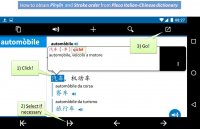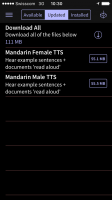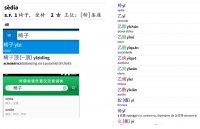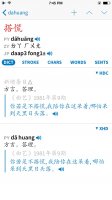@goldyn chyld - we do show pronunciation differences, but due to a bug they only come up when LAC is set to the top of Manage Dictionaries; put it there and you'll see a -> arrow before the Taiwan pronunciation and <- before the other one. Disadvantage of launching dictionaries not in conjunction with an app update... but in our next app update we'll fix it so it works regardless of where you put it. Would you prefer it if we had a second listing of both pronunciations at the top of the entry in the meantime (even if it meant extra space)?
Not sure why those arrows aren't showing up in place of the star and triangle, will check on that one.
@ACardiganAndAFrown - no, now we're charging everyone the same price, but in most cases it's what we charged students before (or what we would have charged students before based on royalties etc). Basically, most of our customers were claiming the discount, so we were pretty much setting our prices based on what students would pay and then tacking on extra for non-students, and that extra wasn't making us enough money to justify arbitrarily penalizing people for not being students (or for being honest enough to admit they weren't students).
We were also motivated by an experiment we did - originally just testing two different variations on the add-on purchase UI to see which would sell more, but it turned out that one variation had the side effect of making people much more aware of the availability of student discounts, and the demand curve in that case was basically perfect - more people bought with discounts but in the end we were making exactly the same amount of money on average per person because people didn't buy when they didn't know about / didn't know if they were entitled to the discount. So we think that the people who were previously not claiming discounts will now end up buying more stuff from us because they're getting it for a lower price.
It was also just confusing, honestly, in the last place in your app where you want things to be confusing - people didn't know if they were entitled to a discount or not, didn't know if they were getting a version of the app that was somehow missing features because it was a student version, etc; we were probably losing quite a few sales just to that alone.
We did student discounts originally back in 2009 because a couple of licenses had minimum pricing that we were only allowed to go below in the context of a student discount; most of those clauses have been negotiated away now, though, so there were very few items left for which we were gaining any extra maneuverability on pricing or royalties by virtue of having a student discount. (and if a new one comes up we can always add back a student discount just for that item)
@Carl Nilsson - no idea about that sentence change, need to check which specific version of the data
@alex_hk90 used.
@sobriaebritas - it's tough to get Western publishers interested in doing Chinese dictionaries, yeah. Any good one you would recommend? (particularly for Spanish-to-Chinese)
I should add that we have pretty expansive rights on this little title - can really add to it however we like and the royalties are structured so that we don't mind putting a bit of effort / money into doing so. So if there's anything we might be able to put a bit of editorial time into that would make this significantly better we could certainly look into doing that.
@Carl Nilsson - could you email or PM me with the Registration IDs from both devices?
@Shun - ah, thanks, should be fixed now; catalog was pointing to updated versions of those files that we haven't released. (nothing too exciting, minor update mostly to add Bitcode support on iOS and x86 support on Android)
@Furio Petrossi - try putting a # before your search; that will do a full-text search of the I-C half.
@goldyn child - ah, that illuminates the example sentence issue too; looks like we accidentally sent out the version based on 两岸常用词典 rather than 两岸词典. (we converted both) Updated version based on the latter coming shortly once we make sure we've got any other problems covered.
Re Guifan, that is odd - I just wrote the publisher, data we got from them only has the one meaning so not sure where the new one went.
@Alexis - that's coming, the reason we don't do it now is because "Restore iTunes Purchases" requires you to re-enter your iTunes password but pretty soon we'll be moving over to Apple's new purchase restore system that doesn't require a password.




